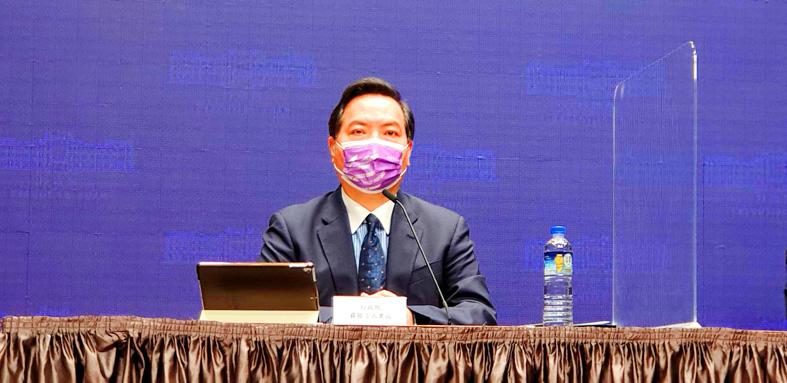The Executive Yuan yesterday told Beijing to stop engaging in cognitive warfare to intervene in Taiwan’s internal affairs, as the nation prepares to vote on four referendums tomorrow.
During a news briefing on Wednesday, China’s Taiwan Affairs Office (TAO) spokesman Ma Xiaoguang (馬曉光) posed 10 questions about what democracy means to the Democratic Progressive Party (DPP) government.
Ma accused the DPP of sowing discord in Taiwanese society, suppressing dissidents, manipulating disagreements between different ethnic groups, exaggerating Chinese military threats, and directly or indirectly meddling in Hong Kong’s affairs, among other allegations.

Photo: Lee Hsin-fang, Taipei Times
In Taipei, Executive Yuan spokesman Lo Ping-cheng (羅秉成) said that the allegations are part of China’s disinformation campaign.
Aside from posing real threats by sending military aircraft and vessels into areas around Taiwan, China has been waging a cyberwar against Taiwan, Lo told a news conference.
It is ridiculous that China, which is not democratic at all, dares to tell Taiwan what democracy means, he said.
Taiwan is a sovereign nation, he said, telling Beijing to stop interfering in its internal affairs.
As for the government’s assessment about the referendum outcome, Lo said that Cabinet members have fully explained the government’s position on the four issues and asked people to vote “no.”
The referendums, covering issues related to energy transition and international trade relations, are pertinent to Taiwan’s development, he said.
The Chinese Nationalist Party’s (KMT) attempts to cast the referendums as a vote of confidence about the Cabinet’s performance is a false and unnecessary connection, he added.
The government will respect the results of the referendums and take proper action, per the Referendum Act (公民投票法), he said, urging voters aged 18 and above to cast their ballots on time.

CHAOS: Iranians took to the streets playing celebratory music after reports of Khamenei’s death on Saturday, while mourners also gathered in Tehran yesterday Iranian Supreme Leader Ayatollah Ali Khamenei was killed in a major attack on Iran launched by Israel and the US, throwing the future of the Islamic republic into doubt and raising the risk of regional instability. Iranian state television and the state-run IRNA news agency announced the 86-year-old’s death early yesterday. US President Donald Trump said it gave Iranians their “greatest chance” to “take back” their country. The announcements came after a joint US and Israeli aerial bombardment that targeted Iranian military and governmental sites. Trump said the “heavy and pinpoint bombing” would continue through the week or as long

TRUST: The KMT said it respected the US’ timing and considerations, and hoped it would continue to honor its commitments to helping Taiwan bolster its defenses and deterrence US President Donald Trump is delaying a multibillion-dollar arms sale to Taiwan to ensure his visit to Beijing is successful, a New York Times report said. The weapons sales package has stalled in the US Department of State, the report said, citing US officials it did not identify. The White House has told agencies not to push forward ahead of Trump’s meeting with Chinese President Xi Jinping (習近平), it said. The two last month held a phone call to discuss trade and geopolitical flashpoints ahead of the summit. Xi raised the Taiwan issue and urged the US to handle arms sales to

BIG SPENDERS: Foreign investors bought the most Taiwan equities since 2005, signaling confidence that an AI boom would continue to benefit chipmakers Taiwan Semiconductor Manufacturing Co’s (TSMC, 台積電) market capitalization swelled to US$2 trillion for the first time following a 4.25 percent rally in its American depositary receipts (ADR) overnight, putting the world’s biggest contract chipmaker sixth on the list of the world’s biggest companies by market capitalization, just behind Amazon.com Inc. The site CompaniesMarketcap.com ranked TSMC ahead of Saudi Aramco and Meta Platforms Inc. The Taiwanese company’s ADRs on Tuesday surged to US$385.75 on the New York Stock Exchange, as strong demand for artificial intelligence (AI) applications led to chip supply constraints and boost revenue growth to record-breaking levels. Each TSMC ADR represents

State-run CPC Corp, Taiwan (CPC, 台灣中油) yesterday said that it had confirmed on Saturday night with its liquefied natural gas (LNG) and crude oil suppliers that shipments are proceeding as scheduled and that domestic supplies remain unaffected. The CPC yesterday announced the gasoline and diesel prices will rise by NT$0.2 and NT$0.4 per liter, respectively, starting Monday, citing Middle East tensions and blizzards in the eastern United States. CPC also iterated it has been reducing the proportion of crude oil imports from the Middle East and diversifying its supply sources in the past few years in response to geopolitical risks, expanding